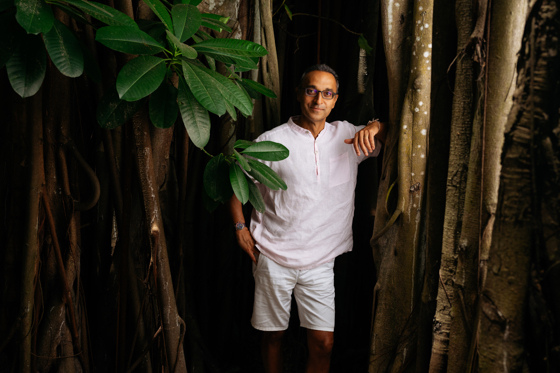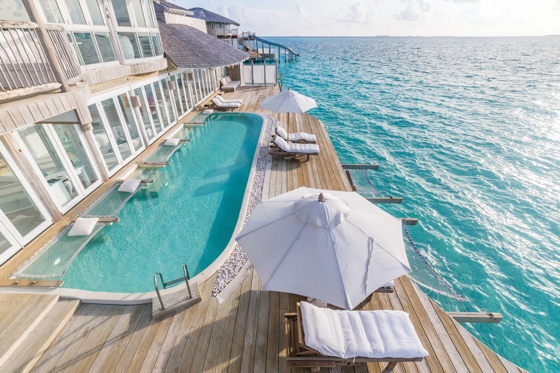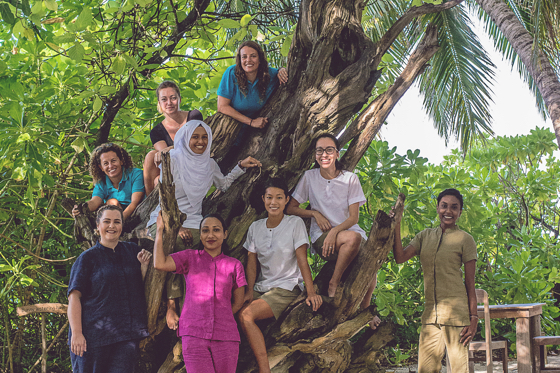Sonu Shivdasani defines luxury as something that is rare, and what is perhaps most rare today for his jet-setting ultra-luxury Soneva resort guests — who spend as much as US$1 million a year across his portfolio — is a lack of distractions.
Shivdasani told HotelsLife that peacefulness – the absence of cable TV and the 24-hour news cycle because TVs are hidden – helps create a suspension of disbelief similar to that of attending, for example, a Shakespeare play where you believe the actors are real.
He believes his “slow life” resorts (sustainable, local, organic, wellness) create a similar experience with shoes collected upon arrival into bags that say “no news, no shoes.” At the jetties where the boat shuttles or float planes bring guests to Soneva hideaways in the Maldives and Thailand, Mister Friday immediately hands them fresh coconut and a cold towel, and that is the moment the sense of uninterrupted bliss begins.
With more urbanization, more stress, more pollution, more traffic jams, Shivdasani said, “just that fresh salad from our garden or walking barefoot, watching a movie in the open air or just breathing in the open air can be a luxury.”
He added that his team is always questioning the idea of what true luxury is because they believe the term is often misused or too loosely defined.
“To me luxury is a philosophy. It is essentially that which is rare, that which is viewed as the truth,” said the 54-year-old hotelier who last November received a fresh capital infusion from shrewd Denver-based PE firm KSL Capital Partners to grow the resort concept further in the Maldives and Okinawa, Japan, and later in top urban markets.
That truth has remarkably translated into 52% repeat business and 95% of guests traveling 10 to 12 hours to reach any of the three Soneva properties. Shivdasani said half of the group’s revenue comes from about a hundred clients who are spending US$100,000 or more.
Targets ahead
KSL took a 30% to 40% stake in Soneva Holdings, while Sailing Capital, which invested in Soneva in 2014, redeemed its investment in Soneva after earning what Shivdasani said was a “healthy return” for its co-development of Soneva Jani Resort, which opened in the Maldives in 2016. Shivdasani and his wife, Eva Malmstrom Shivdasani, who founded Soneva in 1995, today retain the majority stake.

Development will start with two additional resorts in the Maldives, which Shivdasani said will be uniquely positioned as not to cannibalize existing business, as well as a beach resort in the hot market of Okinawa, Japan. One of the new Maldives resorts is expected to finish construction next year and the other will start building in 2021. The Okinawa resort is expected to start construction in 2021 and open in 2023.
Longer term, Soneva wants to grow in Europe (it has property on the Greek island of Milos, and Shivdasani likes Ibiza) and has designs on urban properties in markets like London, Paris and New York City.
The new deal will also allow Soneva to spend about US$30 million on existing assets, including 26 over-water villas at Soneva Jani and eight water villas at Soneva Fushi.
A separate property company has been created for new developments with Shivdasani’s Soneva Holdings pledging 50% stakes in its two Maldives properties for a 50% share. KSL is placing US$200 million in the property company for its stake.
“We’ve realized that at the Soneva level to make money and to make the operation sustainable we need to have very rich people going there,” Shivdasani said during a February interview. “We need to be in destinations where the super-rich go regularly. In the Maldives, for example, 2,000 private jets land there every year.”
At the same time, Soneva likes the idea of remoteness and one of its new resorts in the Maldives will be the only resort on that atoll. “That’s something we’d like to roll out in other locations. It’s not so much an evolution of Soneva because it’s a type of sub-brand that we can roll out in other places if the one in Maldives is successful.”
Brand essence
The goal of Soneva’s core purpose – slow life – is to offer guests luxury while minimizing any impact on the planet. But in many markets, Shivdasani said, people still believe that if it’s sustainable it can’t be luxurious. His belief: “The more sustainable you are the more luxurious you become and that’s really our mission and the point we want to prove to our guests.”

At Soneva Fushi in the Maldives, for example, the team recycles 90% of all waste. “In addition, our beef consumption at our resorts has been reduced by about 75%,” Shivdasani added. “Beef is not on the menu with the exception of just one restaurant at Soneva Fushi, where it’s there only in one particular dish. If a guest wants beef then, of course, it’s optional, but it’s not something we promote.”
Shivdasani said using more plant-based food is now very important for the group. “We have KPIs with our food and beverage team about reduction in red meat, sugar, dairy and white flour on our menus,” he added, saying that about 70% of the fish consumption is locally caught and much of the produce is sourced from their on-property gardens.
Another strategy that drives the business plan is its value, which attracts leaders who believe in the slow life philosophy is the culture. “Your values and culture are the essence of who you are as an organization and that’s what differentiates you and attracts the right people,” Shivdasani said. “Eva and I believe strongly that a company must have a purpose beyond simply enriching shareholders like ourselves and our partners, and paying the employees their salary. When you can do that you can reach a great level of engagement.”
Shivdasani pointed to two colleagues who joined Soneva for those reasons. The CFO, a 14-time Soneva enthusiast before he joined, is very passionate about sustainability and as a guest he’d heard how some of his payment was going to a Soneva foundation. He asked how funds were being deployed and joined the foundation as a trustee. The chief marketing officer was a great fit due to her views on sustainability, food and care toward animals. “This trickles down into our organization,” Shivdasani added.
Continuous innovation surrounding the slow life has led to more guest experience initiatives surrounding health, wellness and community engagement, as well as an emphasis on hiring locals like the glass blower who turns empty liquor bottles into pieces of art and the agriculturalist helping tend to vast gardens, in addition to initiatives surrounding health and wellness in local communities.
What has helped achieve all this, according to Shivdasani, was the sale of the Six Senses brand in 2012. It has given the leadership team more time and flexibility as an owner-operator, and to more quickly evolve and adopt new initiatives.
“If you’re a chain just managing for someone who invested US$100 million on a hotel, they want to have a lot of say in how the hotel feels, looks, operates,” Shivdasani explained. “It’s very difficult to make changes that way, and what I found is that in terms of the guest experience it’s a bit like the iPhone with the apps. I used to tell our owners, you’re buying the iPhone but why aren’t you downloading more apps… Now we have observatories, water slides quirky things like ice cream parlors, zip lines and treetop dining that are quite difficult sometimes for traditional hotel investor to understand. But this is what makes the whole guest experience and differentiates us.”
Nature differentiator
Looking ahead at trends in luxury, Shivdasani, not surprisingly, threw some shade at more traditional luxury brands that do not do enough to differentiate themselves.

“What is the difference between Ritz-Carlton and St. Regis because quite often a developer can take one and just re-flag it overnight?” he said. “If they didn’t have that point of difference, where there’s an excess of supply in a market one of these brands can start discounting and others are going to have to then eventually lower their standards and compromise because they’ll be under a lot of pressure. This need for differentiation is going to be a challenge.”
What’s that differentiator? “We believe quite strongly in this idea of people wanting to go back to nature, to be at one with nature, especially with a growing urbanization. About 70% of the population by 2030 will be urban, and as we have greater and greater urbanization people will appreciate and value the earth and nature more. Those properties that are closer to nature will thrive. We also believe in the wellness and health movement, so plant-based menus and restaurants are going to become the norm.”
Shivdasani closed by saying, “Life is like an onion, there’s always a new layer. So that’s one of the things that motivate me – to find the next layer of the onion skin, to peel it. What I know about life is it never ends. There will always be the next layer of skin.”

